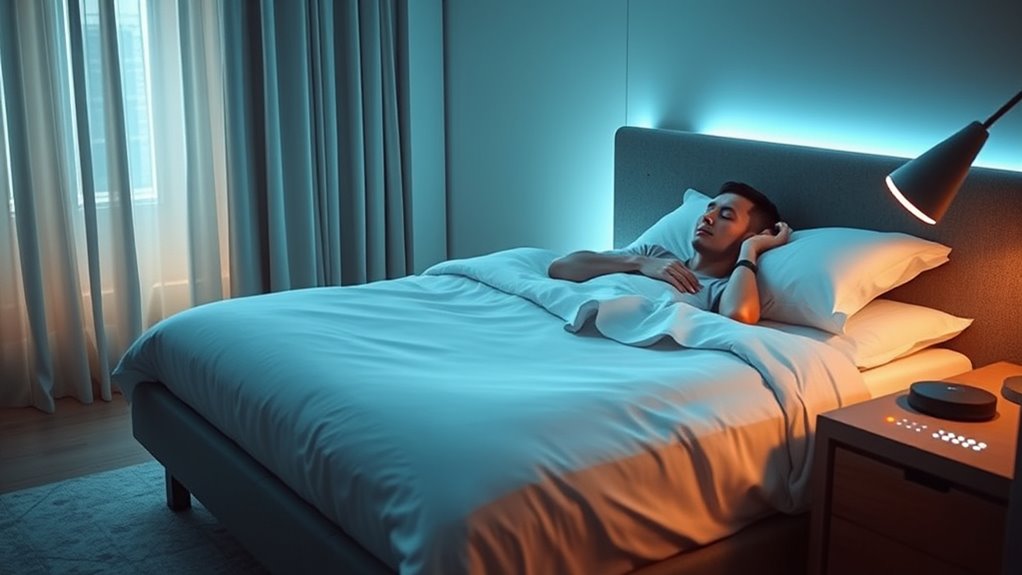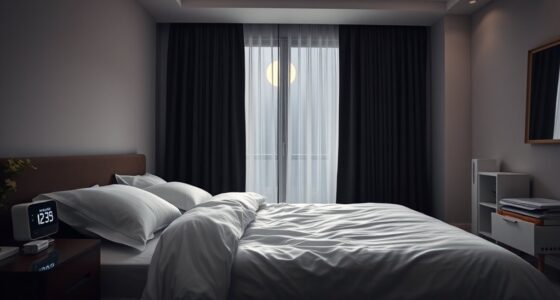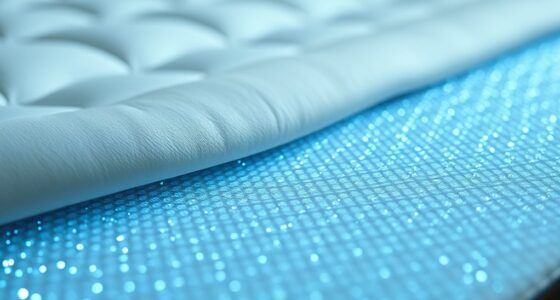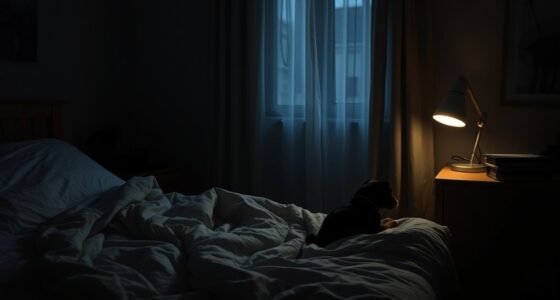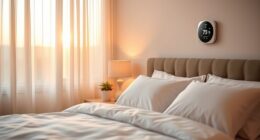Sleep monitoring technologies are evolving to include zero-burden sensors that track your sleep passively, so you don’t need to wear devices or change your routine. These sensors—embedded in mattresses, contactless bedside units, or under-mattress setups—collect data on movement, heart rate, and more without disruption. Advanced data analytics then interpret this information, providing actionable insights to improve your sleep quality. If you’re curious about how these innovations can enhance your rest, you’ll find plenty to discover as you explore further.
Key Takeaways
- Zero-burden sleep sensors like smart mattresses and contactless devices enable passive, continuous sleep monitoring without user effort.
- Wearable devices track movement, heart rate, and temperature to provide detailed sleep cycle insights.
- Data analytics transform sensor data into actionable feedback, identifying sleep disturbances and patterns.
- Advanced sensors and smarter algorithms enhance accuracy and support personalized sleep improvements.
- Integration of unobtrusive monitoring solutions helps users optimize sleep quality and overall health effortlessly.
Sleep monitoring technologies have become increasingly sophisticated, helping you better understand and improve your sleep quality. One of the most popular tools in this domain is wearable devices. These sleek gadgets, often worn on your wrist or clipped onto your clothing, continuously track your sleep patterns without disrupting your nightly routine. They use sensors to monitor movement, heart rate, and sometimes even skin temperature. This real-time data collection allows you to see detailed insights into your sleep cycles, including how long you spend in light, deep, and REM sleep stages. The convenience of wearables means you can wear them overnight without discomfort, making it easier to gather consistent, accurate data. Regular use of sleep trackers can also provide improved sleep quality by helping you identify habits that affect your rest.
Behind the scenes, data analytics plays an essential role in transforming raw sensor information into meaningful feedback. Advanced algorithms analyze your sleep metrics, identifying trends and anomalies that might indicate sleep disturbances or issues. For example, if your data shows frequent awakenings or irregular sleep cycles, the system can suggest lifestyle changes or alert you to consult a healthcare professional. These insights are often presented through user-friendly apps, giving you a clear overview of your sleep health and helping you track progress over days, weeks, or months. The power of data analytics ensures that your sleep data isn’t just numbers but actionable information you can use to make meaningful improvements.
Beyond wearables, other zero-burden sensors have entered the market, offering even less intrusive ways to monitor sleep. These include smart mattresses embedded with pressure sensors, contactless bedside devices, and even under-mattress sensors that detect movement and physiological signals without direct contact. These sensors seamlessly integrate into your sleeping environment, providing continuous monitoring without requiring you to remember to wear or charge a device. They work by capturing subtle movements or physiological signals and transmitting data to apps or cloud platforms for analysis. Because they operate passively, they eliminate the hassle often associated with traditional sleep trackers, making it easier for you to stay consistent with your sleep monitoring.
All these innovations aim to give you an extensive picture of your sleep health with minimal effort. Whether through wearable devices that combine convenience with detailed analytics or zero-burden sensors that blend into your environment, the goal is to empower you with precise, actionable insights. As technology advances, expect even more accurate sensors and smarter data analytics that will help you optimize your sleep patterns, improve overall well-being, and wake up feeling more refreshed every day.
Frequently Asked Questions
How Do Zero-Burden Sensors Compare to Traditional Sleep Trackers?
Zero-burden sensors often outperform traditional sleep trackers because they require less sensor calibration and are less intrusive. You’ll find that data accuracy improves since these sensors seamlessly monitor your sleep without disrupting your movements. Unlike traditional devices, zero-burden sensors provide consistent, reliable insights by integrating smoothly into your environment, making sleep tracking more comfortable and precise. This enhances your overall understanding of sleep patterns effortlessly.
What Are the Privacy Concerns With Sleep Monitoring Devices?
Your sleep data could be at risk of being hacked or misused, making privacy concerns huge. These devices collect sensitive info, and if data security isn’t airtight, your user privacy could be compromised in ways you never imagined. From unauthorized sharing to surveillance, the stakes are high. Always check if the company prioritizes robust data security measures to protect your info and respect your privacy.
Can Sleep Monitoring Technologies Detect Sleep Disorders Accurately?
Yes, sleep monitoring technologies can detect sleep disorders accurately by analyzing your sleep cycle and brain activity. They track patterns like REM and deep sleep stages, helping identify issues like insomnia or sleep apnea. You’ll get insights based on real-time data, allowing for early intervention. Just remember, while these devices are effective, consulting a healthcare professional is essential for a definitive diagnosis and tailored treatment plan.
Are Zero-Burden Sensors Suitable for Long-Term Home Use?
Yes, zero-burden sensors are suitable for long-term home use because they offer good sensor durability and high user comfort. You won’t feel discomfort or irritation, making it easier to wear them consistently. Their durability guarantees they last over time without frequent replacements. This combination of comfort and durability makes zero-burden sensors ideal for continuous, long-term sleep monitoring in your home, helping you track sleep patterns effectively.
How Cost-Effective Are Advanced Sleep Monitoring Systems?
Advanced sleep monitoring systems can be quite cost-effective when you do a thorough cost comparison and affordability analysis. While they might seem expensive upfront, they often save money by reducing healthcare costs through early detection of sleep issues. You’ll find that investing in quality technology can provide long-term value, especially if it helps improve your sleep health. So, weigh the benefits against the costs to determine if it’s the right choice for you.
Conclusion
Imagine sleep monitoring tech as a gentle shepherd guiding you through the night, silently watching over your rest. With zero-burden sensors and innovative innovations, you can embrace peaceful, uninterrupted sleep without feeling like you’re being watched. These technologies are your night-time allies, transforming how you understand and improve your sleep. As they evolve, they pave the way for a future where restful nights are as natural and effortless as breathing.
